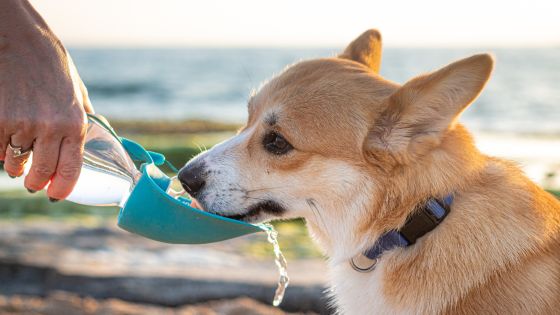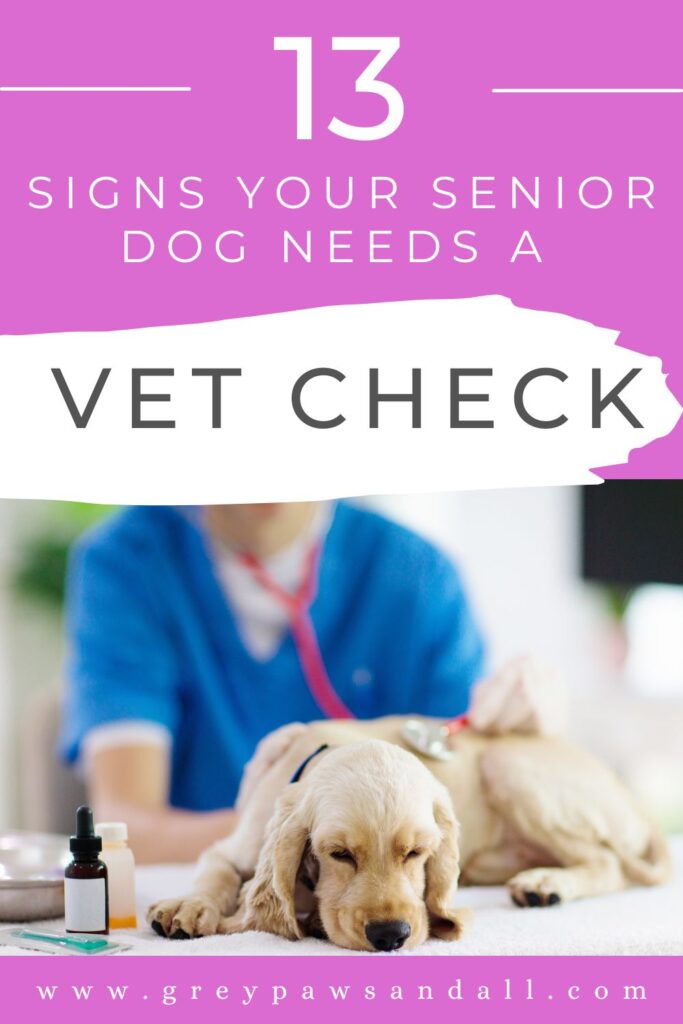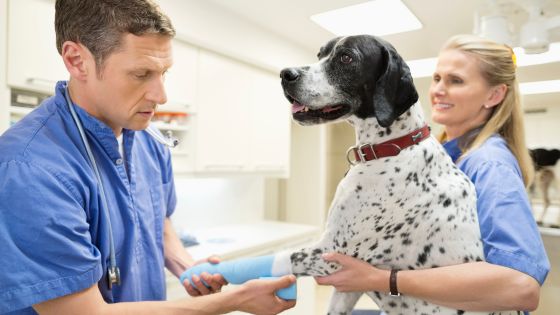When it comes to senior pet care, it’s not usually a good idea to adopt a “wait and see” attitude if you have a concern. Things can go downhill quite rapidly, and a problem caught early has a better chance of being resolved or at least managed.
Call your vet’s office and explain what’s going on. Based on what you tell them they may recommend bringing your dog in right away, or a staff member will have a quick chat with the vet for advice.
Keep in mind vet practices seem to be busier than ever, so despite good intentions they may be dealing with an emergency and forget. I usually give them an hour or two to get back to me, and then call again. I want to make sure there’s still time to pop in if my vet recommends a same day visit.
Depending on the issue you’re concerned about, a quick chat on the phone, sending a video or dropping off a urine sample may be enough to start with.
Helpful tip: Write down as much detail as you can in terms of what you’ve been noticing, when it started, how often it happens, if anything else was going on at the time. The more information you can provide the better.
Signs That Require a Vet Visit
Appetite
Fussy in terms of food, lost interest in eating, or can’t get enough to eat no matter how much you give him or her.
Thirst

Drinking a lot more water than usual. Your vet will ask how much, so rather than say “a lot” it will be helpful if you could give an amount.
A typical dog needs about 1oz of water per pound of weight per day, so measure what you put in the bowl.
Behavior
Your usually friendly dog suddenly turned aggressive, not interested in playing, doesn’t come when called, barking excessively, lethargic, wanders around the house and won’t settle, or any other behavior that seems out of character.
Movement
He or she may be struggling to get out of their bed, dragging their feet, limping, refusing to go on walks/not walking as far, trouble getting traction on slippery surfaces.
Read this ⇒ 5 Effective Ways to Reduce Pain in Dogs with Arthritis
Read this ⇒ Lifestyle Changes to Make Your Arthritic Dog More Comfortable
Read this ⇒ How to Choose the Right Mobility Aid for Your Senior Dog
Poop
Diarrhea, blood, trouble pooping. Diarrhea should absolutely not be left untreated in a senior dog, as they can quickly become dehydrated. One way to check is by gently grabbing (no that’s not a gentle word!) a bit of fur from the back of their neck between your thumb and index finger, then letting it go. If it takes time to flatten back to normal, your dog is probably dehydrated. Your vet may recommend keeping him at the practice for a few hours of IV fluids.
Weight
Losing or gaining weight. Weight loss may be due to nausea as a result of kidney disease for example, and weight gain could be caused by Cushing’s (more pot belly than overall weight gain) or hypothyroidism.
Vomiting
If your dog has been throwing up, especially projectile vomiting combined with an inability to settle, you must call your vet right away. It could be pancreatitis, a potentially deadly condition that must be treated ASAP.
They will probably ask if he ate something from the garbage, if he or she was fed high fat table scraps, or if it’s possible they found something on a walk.
Bad Smell
Is there a bad smell coming from your dog’s mouth? Ears? Skin? Mouth infection/periodontal disease/ear infections/yeast or bacterial infections can be to blame. Keep in mind they can be painful conditions.
Read this ⇒ Why Your Dog Has Bad Breath and What to Do About It
Read this ⇒ What to Do If Your Dog Has Bad Breath
Eyes
Cloudy? Red? Filled with gunk? Bulging? Eye issues cannot be left untreated, and my advice is to see a specialist if possible. You may have to see your vet first, at the very least to get a referral. Regular vets don’t tend to have the experience or equipment needed to treat many eye conditions, and I speak from experience.
Shaking/Crying/Whimpering
These are all signs of pain, and should not be ignored.
Excessive Licking or Scratching
These are often signs of pain, but could also signal an allergy.
Difficulty Breathing
This requires an immediate trip to the vet or emergency hospital.
Twitching/Shaking/Crying Out
These could be signs of a seizure. Vets advise not to pick your dog up during an episode, and to turn the lights off. Of course I found this out after I picked Red up and held her, because that’s what instinct would have all of us do, especially the first time.
Call your vet or emergency hospital right away and get advice from them. Try and pay attention to how long it lasted because they will ask.
I was not prepared the first time it happened, and of course it was late at night. Thankfully it only lasted a few seconds, and I called the emergency hospital right after it was over. I was told if it happens again to bring her in, but otherwise speak to my vet in the morning which I did. I brought her in to see him that day, and asked if there was anything I could keep in the house should it happen again. I was terrified that if there was a next time it may last longer.
He recommended a tube of rectal Diazepam, which would help stop/control a prolonged seizure. You just insert it into their butt and squeeze whatever amount the vet recommends. Thankfully I never had to use it, but I felt so much better having it in the house.
She had a few more episodes over the next couple of years before she passed, but they never lasted more than a few seconds.

I’ve been rescuing and caring for senior dogs since 2009. From vision and hearing loss to obesity, dementia, kidney disease, liver issues, cardiac problems, Cushing’s, mobility challenges and more, you could say I’ve dealt with and learned a lot! In addition to my hands on experience, I’ve taken many courses and earned several qualifications to keep learning how to help senior dogs and they include: Senior Dog Enrichment, Understanding Canine Anxiety, Care of the Senior Pet and I’m a Certified Pet Loss Specialist.


What a great and very helpful list! I lost 2 senior pups this year, but sadly there was nothing the vet could do.
I’m sorry for your loss, it’s so difficult. I hope you’re comforted by the memories of the amazing life you shared together.
People often overlook when their dogs need to see a vet. Sometimes it’s from a financial standpoint. But other times it’s simply from not knowing a problem requires a vet’s attention. This is a great checklist for dog parents, especially those with senior pups. I’m sharing with my dog parents.
I have seen too many senior dog parents who haven’t called their vet when they should have. It’s true, sometimes it’s finances that are a concern, but often they assume the changes they’re seeing are natural signs of aging so they don’t realise there’s something they can do. It doesn’t help if their vet tells them “it’s old age” which sadly happens.
This is a great reference list. Lots of things to look for with our senior pups and you def don’t want to wait too long before contacting your vet. We frequently called and asked for opinions if something seemed off. Great way to ease our minds, help our dogs, and cheaper than making appointments every time. Though sometimes appointments were necessary.
I’ve seen too many senior dog parents wait too long, so I’m hoping this list will help. You were absolutely right to call, it doesn’t cost anything and sometimes a chat is all you need.
Great post as always and I learned a lot from Layla that I am mentally more prepared now, thanks
Excellent post, Hindy. Having senior dogs is such a blessing, but yes, we do have to keep an eye out, and sometimes the signs come suddenly and quickly. Sometimes it is an obvious change, and other times it can be subtle, but we have a gut instinct something is not right as we know our dogs. I made frequent calls and texts to our vet to have mine checked out and was so thankful they trusted me when I said “something is not right.” It’s so important to watch for the signs you mentioned and always get a vet check so senior pups can live a healthy, long life! Sharing this important article with my readers!